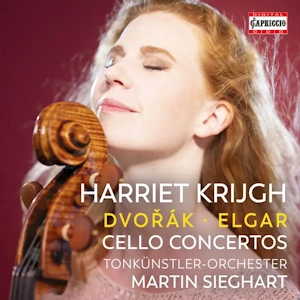
Antonín Dvořák (1841-1904)
Concerto for Cello & Orchestra in B minor, Op. 104 (1896)
Edward Elgar (1857-1934)
Concerto for Cello & Orchestra in E minor, Op. 85 (1919)
Harriet Krijgh (cello)
Tonkünstler-Orchester/Martin Sieghart
rec. 2024, Auditorium, Grafenegg, Austria
Capriccio C5534 [71]
Young cellist Harriet Krijgh here tackles what are arguably the two most popular cello concertos in the repertoire. She and conductor Sieghart take a somewhat broader, more spacious approach to the first movement of the Dvořák concerto than others such as Du Pré/Barenboim, Rostropovich/Karajan and, especially, Fournier and Szell, who are almost two minutes faster; Krijgh brings out the languorous, yearning of the music, phrasing indulgently with generous vibrato – this is a full-blown Romantic account and none the worse for that. She negotiates the challenging coda with ease and the Tonkünstler-Orchester responds with a suitably rich sound; the grandioso, fortissimo restatement of the main theme is just that. What I miss in the orchestra, however, is…hard to describe… a sense of presence or character so much more evident in Szell’s conducting of the BPO; likewise with Karajan directing the same orchestra. Sieghart is a tad bland and I realise that when listening again to Fournier, despite the lack of digital sound and faint hiss and the fact that I think of him as a more patrician, restrained and objective performer, I feel more involvement with his and Szell’s presentation of the music. The older artists – none of whom are now still with us – are perhaps recorded too close to sound naturalistic but for me their recordings bring more to the table.
Rostropovich, too, brings a much darker, more burnished sound to his playing than Krijgh and when I move on to Du Pré, she brings so much more personality and sheer attack to hers. Krijgh’s account of the Adagio, however, is beautiful and I hear far fewer differences between her and her predecessors. Technically, of course, she is wonderful, too – and I like the way she sometimes suppresses her vibrato for especially plangent passages in the middle of the movement. I do, however, find her and Sieghart’s treatment of the finale a little stolid and unyielding; she is slower than any of the cellists above and for me, despite her lovely tone, the movement is lacking in some drive and spring.
I likewise made cruel comparison with some celebrated recordings of Elgar’s concerto – which I personally esteem even above Dvořák’s great work – and of course a similar line-up of great cellists have recorded their versions. I am indelibly imprinted with Du Pré but also love Alisa Weilerstein’s version with Barenboim. It possibly has something to do with the naturalness of the Capriccio recording, which probably more accurately reflects the true, live-concert experience but right from the start Weilerstein has much more bite and presence; moving on to Du Pré, one realises how much more drama Barbirolli gets out of the first slow and the hesitant, then agitated, opening to the second movement. I also prefer the overt emotionalism of Weilerstein’s Adagio over Krijgh’s more classical restraint although I again concede that, as ever, she is aesthetically and technically flawless. Nonetheless, I think the concerto needs more dynamism if it is not to play into the hands of critics like the buffoons who, on its American premiere, damned it as dull and depressing. In brief, I cannot see that I would return to this recording when I can hear more stirring and animated renderings by my favourite exponents.
Balances are excellent, though as I remark above, obviously one always suspects that the engineering in all recordings favours the soloist – which accounts for why sometimes in live concerts a solo cellist can seem dwarfed by a full symphony orchestra and I heretically prefer to listen on disc.
There is absolutely nothing “wrong” with Krijgh’s account of these two concertos yet the “burden of the past”, residing in the fact that every famous cellist has played them, from Casals, Piatigorsky and those I name above to Starker, Maisky, Lloyd Webber, Isserlis, Yo-Yo Ma and many others, makes it hard to recommend this new version over a dozen others when in the end it lacks personality.
Ralph Moore
Buying this recording via a link below generates revenue for MWI, which helps the site remain free




















